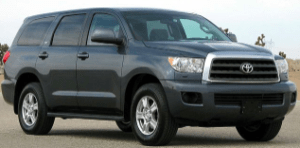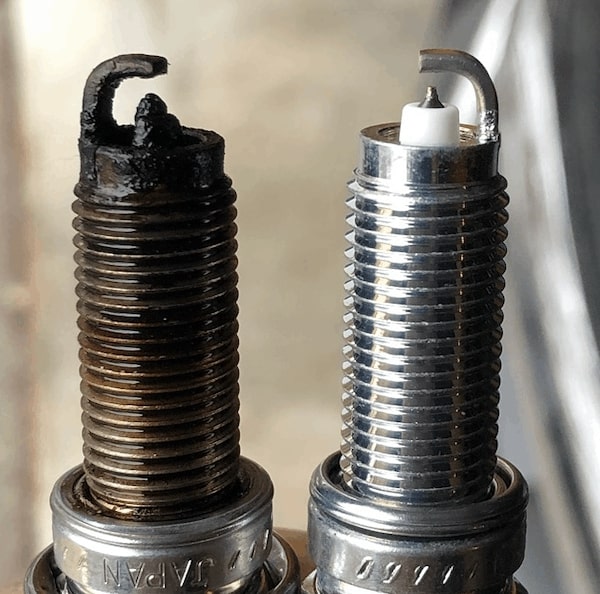One of the most disconcerting sounds that you can hear coming from your Toyota Sequoia is the engine knocking. An engine knock can be a sign of major engine problems. It is usually caused by, ignition issues, timing issues, worn lower engine parts, and more. We’ll cover the most common causes below.
By definition, an engine knock is caused by the burning of the air/fuel mixture at the wrong time, or an inconsistent burning. The fuel will burn in clumps instead of all at once. Once clump will burn the next clump and so on, instead of one continuous ignition.
This creates the knocking sound and creates a lot of unwanted pressure on the combustion chamber and pistons, which can lead to engine damage.
An exhaust leak can often sound like a knock when it’s coming from one of the manifolds.
Engine Knock Causes: Toyota Sequoia
Before you do any looking around, is the check engine light on? If it is, it’s time to get the diagnostic codes from the ECM and use those to help you find the problem. If you don’t have an OBDII scanner, the local parts store will usually scan for codes for you as a courtesy.
Here are a few of the most common issues that would cause your Sequoia’s engine to knock:
Bad Spark Plugs
The most common reason that the engine would be knocking is bad spark plugs. Spark plugs are vital to proper engine combustion. There needs to be a strong spark in order to achieve strong, clean combustion.
Over time, spark plugs can fail for a few different reasons:
- Wrong Plug– If you aren’t using the spark plug recommended by Toyota, it would be a good idea to go ahead and swap them for the right plug. The wrong plug can burn too hot or cold, which has a direct effect on the combustion, and cause engine knocking.
- Worn Out Plug– Spark plugs can wear out over time. You need to replace the spark plugs at the recommended intervals. If you have high mileage, or if the plugs look worn, go ahead and change them all.
Spark plugs are the most common part of the ignition system that can cause your Sequoia to knock, and definitely where you should start looking. But there are other parts, such as the coil packs and plug wires (if equipped) that you should be looking at.
The coil pack sends a spark to the plugs. If they are sending a weak spark, the air/fuel mixture will not be able to properly fire, no matter how good the spark plugs are.
Carbon Deposits
Carbon can form in the top of your Sequoia’s combustion chamber. This effectively increases the compression ratio. Too much compression can lead to detonation.
Modern fuels are required to keep carbon cleaning detergents mixed in with them. Even so, deposits still do build, which can lead to a knocking sound.
If this is the case, you will need to bring your Sequoia into a shop to have it cleaned. You could also try one of those cleaners in a bottle, although we recommend bringing it to a professional.
Wrong Octane/Bad Gas
Bad fuel can cause your Sequoia’s engine to knock. The wrong fuel can also cause a knocking sound.
Using fuel with the proper octane rating is important. If you need to be using premium fuel, use it. Saving a couple bucks per fill up can do real damage to your engine.
Air/Fuel Mixture Too Lean
Sensor issues can cause the air/fuel mixture to lean out. If the mixture gets incredibly lean, it can cause your Sequoia’s engine to knock. Bad fuel injectors, oxygen sensors, MAF sensor, and more can cause a lean air/fuel mixture.
Timing
All of the internal parts of your Toyota Sequoia’s engine, as well as the sensors and computer, coordinate the engine timing so that the spark plug fires at exactly the right moment. If something is off with this timing, the fuel will fire at the wrong time, and there can be a knock.
See:
Timing Chain Jumped Symptoms and Diagnosis
Toyota Sequoia: Bad Timing Belt or Chain Symptoms
Knock Sensor
Modern engines use a knock sensor to correct knocking automatically. If the knock sensor goes bad, then the engine can knock. A bad knock sensor will often throw a trouble code, such as P0325 (knock sensor “1”).
Worn Bearings
Rod bearings exist in-between the crankshaft and piston rods. If they wear out the pistons will no longer be able to smoothly move. Your Sequoia will knock when this happens. The only thing to do in this situation is a lower engine rebuild.
Conclusion: Sequoia Engine Knock
Good luck finding the cause of your Sequoia’s knocking engine. If there is anything that you would like to add, please leave a comment below.


